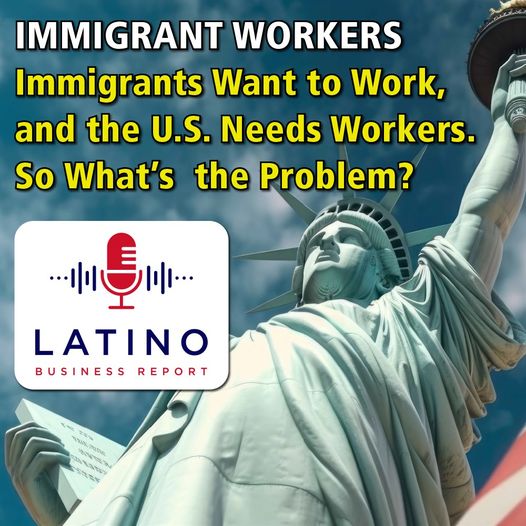Offering Work Permits to Immigrants Who Lack Them Would Help to Abate Inflationary Workforce Shortages
 Experts on immigration policy discussed the US inflationary workforce shortage crisis and its impact on the economy and businesses nationwide on a recent episode of the Latino Business Report podcast. Show Host JR Gonzales and Juan Carlos Cerda and James O’Neil with the American Business Immigration Coalition discussed the need for a solution to expand work permit opportunities for immigrants in the US who lack them, which has been gaining support from business leaders and Republican politicians including Governors Eric Holcomb of Indiana and Spencer Cox of Utah.
Experts on immigration policy discussed the US inflationary workforce shortage crisis and its impact on the economy and businesses nationwide on a recent episode of the Latino Business Report podcast. Show Host JR Gonzales and Juan Carlos Cerda and James O’Neil with the American Business Immigration Coalition discussed the need for a solution to expand work permit opportunities for immigrants in the US who lack them, which has been gaining support from business leaders and Republican politicians including Governors Eric Holcomb of Indiana and Spencer Cox of Utah.
Highlighting the extent of inflationary US workforce shortages, Gonzales cited US Department of Labor statistics.
“41% of crop farmer workers lack legal work authorization… and even if all unemployed Americans found employment, there would still be approximately 4 million jobs that would need to be filled,” said Gonzales.
O’Neill further elaborated on how US workforce shortages impact consumers.
“In farmwork we are seeing prices of agricultural goods go up. And this month, the United States for the first time in history is slated to become a net importer of food, as opposed to a net exporter, meaning that we're relying externally for the foods that Americans need to survive. So the consequences are drastic and are being felt in every single sector of the economy,” said O-Neill, explaining that switching from domestically produced crops for imports means higher food costs and lower food safety standards.
“The problem that we're facing is in every industry. Most folks know their favorite restaurant has changed hours, is seating fewer people, or they're seeing longer wait lines because of the staffing shortage. Folks that are building new homes are finding that it's more expensive and taking longer because there aren't the contractors to complete the work. Folks in big cities are experiencing more potholes because there aren't the folks to fill in the potholes and build our infrastructure,” added O’Neil.
Cerda explained that the US immigration system’s failure to provide adequate pathways for the workers that the US economy needs to migrate here legally leads to economic migrants piling up at the border trying to fill the jobs gaps. Congress’ failure to provide a solution to this situation for decades had led to increasing calls for President Biden to expand immigrants’ access to work permits through a process called parole.
“The mismatch that we have is employers in the United States needing all these workers, but migrants unable to legally get the work permits to work for these employers…that's why we're asking President Biden to expand work authorization and parole for immigrants who already live inside the country but don’t have work authorization, and to migrants who are arriving at our southern border,” said Cerda.
“Here in Texas, we have over 745,000 unfilled jobs as reported by the Bureau of Labor Statistics… if people can earn work permits, they're able to have job mobility and they can go to industries that desperately need them instead of having to work under the table and be subject to harassment from immigration agents and potential labor abuses,” added Cerda.
Speakers highlighted a summit and rally that will urge the Biden Administration to expand work authorizations occurring November 13-14 at the US Capitol, which is expected to gather over 5000 business leaders and advocates who support such a solution.
To learn more about these issues, check out Epsiode 77 of the Latino Business Report Podcast: Immigrants Want to Work, and the U.S. Needs Workers. So What’s the problem?








